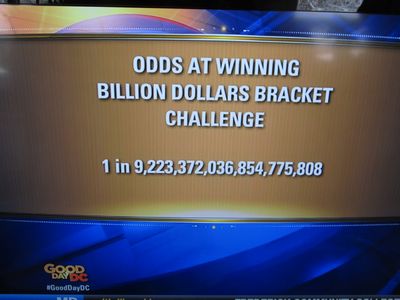Subscribe to Blog via Email
Good Stats Bad Stats
Search Text
June 2025 S M T W T F S 1 2 3 4 5 6 7 8 9 10 11 12 13 14 15 16 17 18 19 20 21 22 23 24 25 26 27 28 29 30 -
Recent Posts
goodstatsbadstats.com
Probabilities and the Warren Buffett March madness challenge
 Warren Buffett has put forth a challenge for anyone to try to pick the winners of all 63 matches in the March madness NCAA tournament.
Warren Buffett has put forth a challenge for anyone to try to pick the winners of all 63 matches in the March madness NCAA tournament.
The odds of getting it right were quoted as anywhere from one in 4,294,967,296 or one in 9,223,372,036,854,775,808 at the Forbes website. The one in 9,223,372,036,854,775,808 seems to have gotten a lot of play in the media. The local Fox network station showed the graphic at the right and went to great lengths about it. It is a screen capture from their broadcast that is shown at the right.
In truth the one in 9,223,372,036,854,775,808 figure is a gross overstatement of the true odds for anyone who knows just about anything about the tournament. Many websites seem to have caught on to that fact. The number was arrived at based on the very simple model that each team has a fifty percent chance of winning each game it plays. But that is simply not true. The likelihood of the number one ranked team in each bracket of winning its first game against the 16th ranked team is much better than that. Anyone playing this game can increase their odds of winning considerably by simply picking the number one ranked team in the first round.
So what is the true probability? That would be almost impossible to calculate. I laugh at the purported accuracy of the one in 4,294,967,296. It truth that number is likely based on some model of the probabilities of winning for each team. And it may even be in the right ball park.
I won’t go to he trouble of playing the game. But if I did my strategy would be one of random selection. The Bayesian in me says use past data to estimate the probabilities for the various match-ups. Thus I would use historical data to get a reasonable approximation of the probability of the team ranked in n-th position beating the m-th ranked team for all pairs (n,m). I would then do a bit of smoothing of the probabilities as I doubt that there is enough data to give fully stable probability estimates. I would not want to be using probabilities where the chance of a 6th ranked team beating a 7th ranked team was less than the probability of the same 6t ranked team beating a 9th ranked team. Next I would pull out my trusty random number generator and make selections at each stage of the tournament based on simple random selections and my set of probabilities. That at the very least avoids any possibilities of my own biases about the various teams slipping into the selection process. It also allows for incorporation of the upsets that happen every year to make it into my selection. It is then a matter of hitting just the right set of upsets.
Posted in Methodolgy Issues, The Media
So have you made a bracket then?